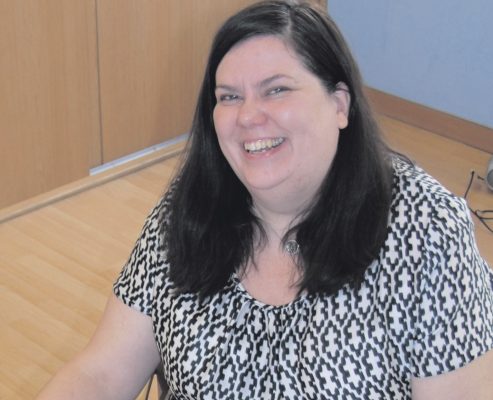The Post: Art Therapist, Cancer Focus, Northern Ireland
The Post Holder: Joanne Boal
HOW I BECAME AN ART THERAPIST
Give an outline of your career to date
My first job was in graphic design then I studied Fashion Design at Leicester Polytechnic because I wanted to be a shoe designer and it was the only course that offered that element. During my second year of that course, I attended a trade show in Paris and showed my portfolio of designs to a trend agency called Promostyl. They offered me a student placement and paid me £2,000. After graduating, I returned to the same company and stayed there for four years.
It was a very fast-moving career and I loved it but I wanted to return home so I applied to be the artist-in-residence at Corrymeela in Ballycastle. I also volunteered with the Probation Board where I was supervised by an art therapist then went to Queen’s University to do a Master’s degree in Art Psychotherapy. When I graduated from Queen’s, I landed a job with Cancer Focus Northern Ireland as an art therapist and I’ve been here for 10 years now.
What was your favourite subject at school?
Art, not surprisingly. I couldn’t spell well and I was terrible at maths but art allowed me to express my creativity. I did art for A Level and was one of the students chosen to exhibit my work at Riddel Hall in Belfast.
Did you go onto further and higher education and if so what did you study and where?
Yes, I studied General Art first of all at Rupert Stanley College in Belfast. My first degree course was in Fashion Design at Leicester Poly, followed by my Master’s at Queen’s.
How did you get into your area of work?
Art therapy is a combination of counselling and the power of art itself. My Master’s gave me the relevant qualification and my experience of using art with different age groups through my Corrymeela work and Probation Board volunteering, helped me get the job I’m in now with Cancer Focus NI.
Were there any essential qualifications or experience needed?
There is an art therapy course starting in the Art College in Belfast this September, which was previously offered at the Centre for Psychotherapy at Knockbracken.
I am often approached by students looking for work placement but because we’re dealing with end of life, I don’t think it’s appropriate to take anyone in unless they’ve been through that course. Anyone wishing to apply to that
course should consider getting some work experience in the voluntary sector first, perhaps with children who have behavioural problems or pensioners with Alzheimers; anywhere where art can be used with different people.
Are there alternative routes into the job?
Not really because if you qualify as an art therapist you have to be registered with the Health and Care Professions Council and Allied Health Professions. People can’t just turn up into a room with a box full of art materials and think they can be art therapists.They have to be properly qualified.
What does a typical day entail?
On a Wednesday I go to the Royal Victoria Hospital for Sick Children’s, where I work with toddlers and older children, some of whom are in isolation. Thursdays are spent at the Cancer Centre at Belfast City Hospital, where I run art therapy groups for people who are going through treatment and those who are further down the line. The other days are spent at Cancer Focus NI’s office at Eglantine Avenue, where do I do art journaling, a combination of art and creative writing and one-to-one sessions with cancer patients as well as bereaved adults and children.
What are the best and most challenging aspects of the job?
I love seeing people’s creativity exploding onto the page. That’s definitely the best part of the job. It’s a real privilege to be with people when they’re making art. Art is a release for their feelings and emotions and it’s important cancer patients have that outlet. The toughest part, not surprisingly, is when you get attached to someone and they pass away. That’s very hard.
Why is what you do important?
In a world of fast-moving, technology and social media, using real art materials can help people connect with their inner child, no matter what age they are, and can give them the freedom to express themselves and deal with things that are too difficult to talk about. After all, we are dealing with life and death every day. If I can distract someone from their pain for five minutes or more, then my job will have been worth it.
Describe your ideal day off
I have been journaling myself since I was 21 years old, through writing and art, so I’d definitely include that in my perfect day off. I’m a farmer’s daughter and I love the countryside. Being outside brings me peace.


